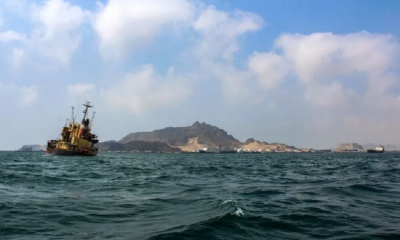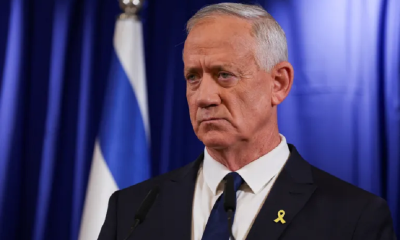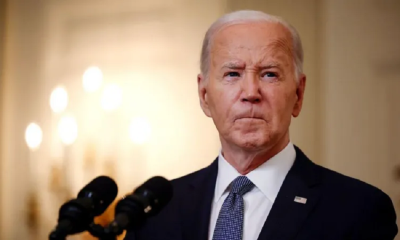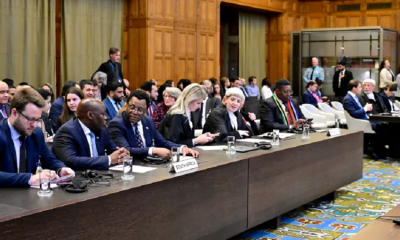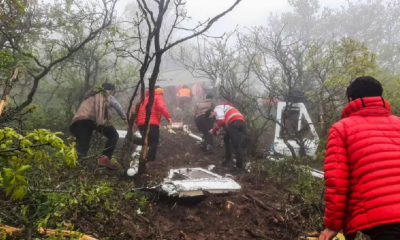Latest News
Joe Biden expects Iran to attack Israel ‘sooner than later’

US President Joe Biden says he expects Iran to attack Israel “sooner than later”, as fears grow of Iranian retaliation over an air strike that killed top commanders early this month.
Israel has not admitted attacking an Iranian consulate in Syria but is widely believed to have been behind it.
US officials have told CBS News, the BBC’s US partner, that a major attack on Israel could happen imminently.
Israel says it is ready to defend itself. Mr Biden told Iran : “Don’t.”
“We are devoted to the defence of Israel. We will support Israel,” Mr Biden said. “We will help defend Israel and Iran will not succeed.”
Iran backs Hamas, the Palestinian group fighting Israel in Gaza, as well as various proxy groups throughout the region, including some – such as Hezbollah in Lebanon – that frequently carry out strikes against the Israelis.
On Friday, Hezbollah said it had launched “dozens” of rockets from Lebanon towards Israel. An Israel Defense Forces (IDF) spokesman said around 40 missiles and two explosive drones had been launched. No casualties were reported and there were no indications of involvement from other actors.
A US official told CBS the barrage was separate from any expected Iranian attack on Israel.
BBC Security Correspondent Frank Gardner says Iran is deliberately keeping the Middle East and Washington guessing.
Ever since the lethal 1 April strike on the consulate building in Damascus, from which Israel believes Iran was directing its covert arms supplies to Iranian proxies in Lebanon and Syria, Iran’s security establishment has been debating its response.
This is all about calibration. Hit too hard and Israel will respond with devastating force. Go too lightly and Iran will risk being seen as weak and ineffective. From a tactical perspective, it makes no sense for Iran to respond right now, when the region is on full alert and when the US has been telling the world what to expect.
Pragmatists in Tehran and Qom will be urging restraint, while hawks, including the ageing Supreme Leader, Ayatollah Khamenei, will be demanding a firm response.
But Iran does not want a full-scale war, nor do its neighbours on the Arab side of the Gulf. Governments there have already asked Iran for restraint. The question now, our correspondent says, is whether it is the hawks or the doves who prevail.
The mounting tensions have led countries including the US, UK, India and Australia to warn against travel to Israel. Germany called on its citizens to leave Iran.
The US state department also barred diplomatic staff and their families in Israel from travelling outside the cities of Tel Aviv, Jerusalem and Beersheba.
Israeli Prime Minister Benjamin Netanyahu has met members of his war cabinet amid the warnings.
Some Israelis said they were not worried about a potential Iranian attack. “We know that we are surrounded by enemies, in the south, in the north, the east and the west,” Daniel Kosman told AFP news agency at a market in Jerusalem. “We are not afraid, I can promise you. Look around: people are going out.”
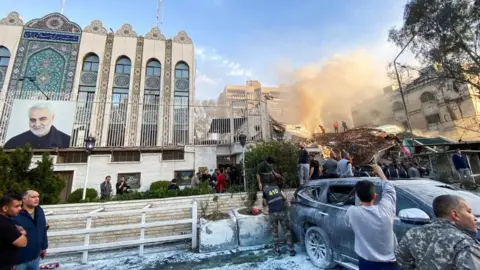
Israel has not claimed responsibility for the strike in Damascus but is widely considered to have carried it out (BBC)
The Israeli government has not issued any new advice to its people on top of existing guidance to stock up on water, food for three days and essential medicine. Israeli radio, however, reported local authorities had been told to prepare for the possibility of an attack, including by assessing the readiness of public shelters. Last week, the Israeli military cancelled home leave for combat troops, bolstered air defences and called up reservists.
Thirteen people were killed in the 1 April missile strike on the Iranian consulate in Damascus. They included senior Iranian military leaders, among them Brig Gen Mohammad Reza Zahedi, a senior commander of Iran’s elite Quds Force in Syria and Lebanon.
Israel has not commented but is widely considered to have carried out the attack.
Officials in several countries have been trying to dissuade Iran from launching an attack, fearing it could spark a wider regional war.
US Secretary of State Antony Blinken has spoken to the foreign ministers of China, Saudi Arabia and Turkey in an attempt to convince them to use their influence with Iran.
After meeting the commander of US Central Command on Friday, Israeli Defence Minister Yoav Gallant said the bond between the two countries had been strengthened by the threat, adding “we will know how to respond”.
The war in Gaza was sparked when Hamas attacked Israeli communities near the Gaza Strip, killing about 1,200 people, most of them civilians, and taking more than 250 hostage. Israel says that of 130 hostages still in Gaza, at least 34 are dead.
More than 33,600 Gazans, the majority of them civilians, have been killed during Israel’s campaign in Gaza, the Hamas-run health ministry says.
The conflict has also seen Israel trade almost daily fire across its northern border with Hezbollah, while Iran-backed groups in Iraq and Yemen have attempted to hit Israeli territory as well as US bases in Iraq and Syria.
Yemen’s Houthi movement has also attacked shipping in the Red Sea, sinking at least one ship and prompting the US and UK to conduct air strikes on Houthi targets in Yemen.
(BBC)
Latest News
Sparkling Aaron George ton seals record chase, powers India into U19 WC final
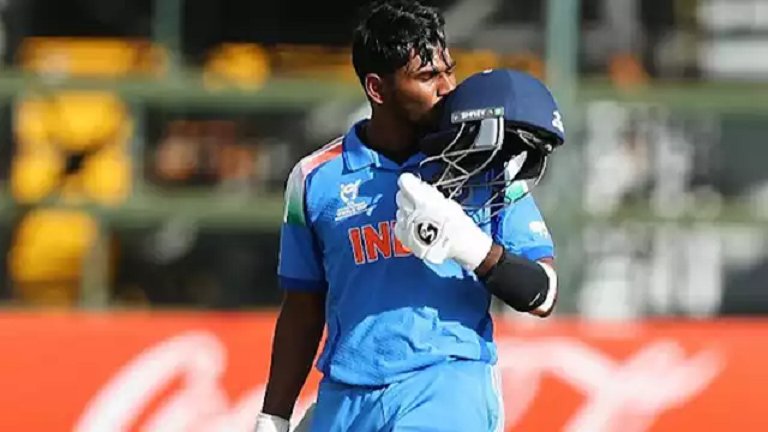
On a batting beauty at the Harare Sports Club, India’s assembly line of batting talent was out in full splendour in the Under-19 World Cup semifinal. There were two centurions in a statement innings from Afghanistan, but Uzairullah Niazai and Faisal Shinozada’s knocks – glorious as they were – were rendered footnotes by a superb century from Aaron George, who led India’s record chase of 311 with the kind of composure that belied his low scores from earlier in the tournament.
Afghanistan 310/4 in 50 overs (Faisal Shinozada 110, Uzairullah Niazai 101; Kanishk Chouhan 2-55, Deepesh Devendran 2-64) lost to India 311/3 in 41.1 overs (Aaron George 115, Vaibhav Sooryavanshi 68, Ayush Mhatre 62; Nooristani Omarzai 2-64) by 7 wickets.
Latest News
Pakistan PM Sharif on India boycott: ‘A very considered stance, and we should completely stand by Bangladesh’

Shehbaz Sharif, the Pakistani Prime Minister, has said Pakistan’s decision to boycott the game against India at the men’s T20 World Cup 2026 was a show of solidarity with Bangladesh, after their removal from the tournament.. It is the first time any official from either the Pakistan state or the PCB has publicly touched upon the reasons for the boycott.
“We have taken a very clear stand on the T20 World Cup that we won’t play the match against India because there should be no politics on the sports field,” Sharif told members of his cabinet on Wednesday. “We have taken a very considered stance, and we should completely stand by Bangladesh, and I think this is a very appropriate decision.”
The Pakistan government put out a post on Sunday saying that while the team would participate in the T20 World Cup, it would not take the field in the February 15 group game against India. The post, which came after a week in which Pakistan’s participation in the tournament had become uncertain, did not give any reason for the decision.
The PCB has not spoken publicly on the matter, but the ICC issued a response a few hours after the X post, in which it said it hoped “that the PCB will consider the significant and long-term implications for cricket in its own country as this is likely to impact the global cricket ecosystem, which it is itself a member and beneficiary of.”
It is not known whether the PCB has officially notified the ICC, or whether there has been any contact between the two bodies. The ICC had said that it “expects the PCB to explore a mutually acceptable resolution, which protects the interests of all stakeholders.”
The Prime Minister’s comments confirm, however, that the boycott decision is linked to what the PCB chief Mohsin Naqvi – the interior minister in Sharif’s government – called the ICC’s double standards in excluding Bangladesh from the T20 World Cup.
Bangladesh were replaced in the world event after their government refused to let the team travel to India, where they were based for their games. The government, citing security concerns, wanted Bangladesh to play their games instead in Sri Lanka, the co-hosts for the event, and where Pakistan will play all their games.
Latest News
BCB receives investigation report on sexual misconduct allegation

-

 Opinion6 days ago
Opinion6 days agoSri Lanka, the Stars,and statesmen
-

 Business5 days ago
Business5 days agoHayleys Mobility ushering in a new era of premium sustainable mobility
-

 Business2 days ago
Business2 days agoSLIM-Kantar People’s Awards 2026 to recognise Sri Lanka’s most trusted brands and personalities
-

 Business5 days ago
Business5 days agoAdvice Lab unveils new 13,000+ sqft office, marking major expansion in financial services BPO to Australia
-

 Business5 days ago
Business5 days agoArpico NextGen Mattress gains recognition for innovation
-

 Business4 days ago
Business4 days agoAltair issues over 100+ title deeds post ownership change
-

 Business4 days ago
Business4 days agoSri Lanka opens first country pavilion at London exhibition
-

 Editorial5 days ago
Editorial5 days agoGovt. provoking TUs




